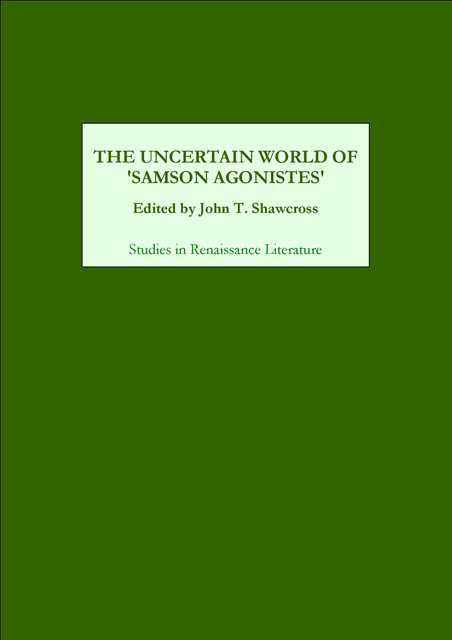Book contents
- Frontmatter
- Contents
- Preface
- Chapter 1 The World of Samson Agonistes
- Chapter 2 Uncertainty and the Text
- Chapter 3 The Dramatic Work and its Reading
- Chapter 4 Samson: God’s Champion, a Type, or Individual?
- Chapter 5 Dalila: Seductress or Wife?
- Chapter 6 Politics in the Destabilized Text
- Chapter 7 Biographical Intrusions
- Chapter 8 The Uncertainties of Irony
- Chapter 9 A Hermeneutics of the Text
- Chapter 10 Samson Agonistes and Consistencies of Belief
- Works Cited
- Index
Chapter 8 - The Uncertainties of Irony
Published online by Cambridge University Press: 22 March 2023
- Frontmatter
- Contents
- Preface
- Chapter 1 The World of Samson Agonistes
- Chapter 2 Uncertainty and the Text
- Chapter 3 The Dramatic Work and its Reading
- Chapter 4 Samson: God’s Champion, a Type, or Individual?
- Chapter 5 Dalila: Seductress or Wife?
- Chapter 6 Politics in the Destabilized Text
- Chapter 7 Biographical Intrusions
- Chapter 8 The Uncertainties of Irony
- Chapter 9 A Hermeneutics of the Text
- Chapter 10 Samson Agonistes and Consistencies of Belief
- Works Cited
- Index
Summary
THE concepts of tragedy that we have looked at in Chapter 3 and the questions of Samson’s development taken up in Chapter 4 do not really account for the reader’s reaction at the end of the dramatic poem. This reaction is due in large part, I argue, to a vague identification with the hero and becomes the key to what is the tragedy that the drama exposes. The substance of tragedy has been molded in various ways. At the base is the effect which the readers (or audience) feel when the final lines are voiced, an effect rather difficult of definition or description. As I read the final lines of Samson Agonistes I am crushed by a sense of waste, a sense of What is the Good? a sense of frustration. Samson seems to have triumphed and his faith in God seems to have been shown, and the “evil” Philistines have been punished for their treatment of the Danites and Samson particularly. But have the Philistines been punished indeed? has the audience achieved new acquist? are we certain God’s face will appear when least expected? It is this sense of frustration which dominates. We are calmed by having experienced a serious imitation of our own sense of pity and our own fears of life, but we recognize that Samson’s story is constantly played through time and that we are part of another recurrence. The pity we feel is both self-pity and compassion for others caught in the trials of life. We are too often Samson the proud, the self-defeated one relying on “prophecy” and on hope. The fears we experience concern both our personal conquering of temptations and the pernicious motives that surround us everywhere. We are constantly like Samson making bad choices and succumbing to self-deceit. We constantly look to the future to be different and to solve the ills and problems of the past – a kind of “Happy New Year” syndrome.
What sets Samson Agonistes apart from much Elizabethan tragedy is that we do not feel simply a contest between virtue and vice with everything neatly colored white or black. We are not, in this drama, shown the road to ruin: the road already has been walked. We are not shown the way of all flesh: the flesh has previously succumbed.
- Type
- Chapter
- Information
- The Uncertain World of Samson Agonistes , pp. 102 - 111Publisher: Boydell & BrewerPrint publication year: 2001

